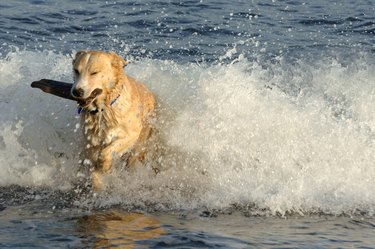
Neutering your male dog -- a gonadectomy -- reduces his level of the male hormone testosterone, so you may see differences in any hormone-related physical and behavioral attributes; specific growth effects include a larger size due to growth plates remaining open longer, and in some cases, obesity. There are other variables that can influence these possible effects, however, including your dog's breed and age when neutered. Discuss possible effects and concern with your veterinarian so he can determine the optimum time to neuter your dog.
Benefits of Neutering the Male Dog
Video of the Day
Neutering prevents accidental breeding and adding unwanted puppies to an already exploding dog population in the United States. It also protects your dog from testicular cancer, and can keep his prostrate healthy as he ages. The reduced testosterone is likely to lessen urine marking, and also curtail or eliminate his urge to roam, diminishing his exposure to external dangers. It can abate any aggressive tendencies -- not just in your dog, but other dogs' reactions to him. He may have less urge for sexual mounting. You may not notice as much of a difference in a dog old enough to develop these behaviors and habits over time. If any undesirable behaviors continue to be problematic post-gonadectomy, consult your veterinarian for suggestions or take him to a professional trainer.
Video of the Day
Neutering and Growth
Removing testosterone typically delays the closing of the bone growth plates in dogs aged 7 months or younger, resulting in a slightly taller dog. He also may have a tendency to gain weight, but unlike his bone plates, this is something you can prevent or reverse with diet and exercise, and may be affected by the age at which he is neutered.
Traditional Neutering Ages
If you adopted a pound puppy, odds are the shelter's veterinarian neutered him as young as 8 weeks of age, as long as he was healthy enough for the procedure. Several studies support the safety of this early age neutering, including one that found that puppies as young as 7 weeks recover from anesthetic quickly and have fewer complications than those neutered at 7 months. Early neutering prevents shelters having to rely on adopters to get dogs neutered as a way to control an increase in unwanted pets. Outside of shelters, veterinarians traditionally neuter at 6 months or later, but this seems to be rooted in tradition rather than science. The American Veterinary Medical Association supports each veterinarian's judgment on what age to neuter based on the individual dog and owner's preferences and lifestyle. If you adopt or acquire an intact older dog, your veterinarian can determine if he can safely undergo the gonadectomy. He has a greater chance of complications if he's obese, so your veterinarian may recommend a weight-loss program prior to surgery.
Drawbacks of Early Neutering
Early neutering -- before one year of age -- could lead to an increase in hip displaysia diagnoses at a younger age than dogs neutered later in life, but researchers who reviewed neutering records caution that several variables may influence these diagnoses. It's possible that changes in joint conformation -- caused by the delay in bone plate closure neutered dogs experience with the decline in testosterone -- lead to inaccurate diagnoses. The condition may be less severe among early neutered dogs.
Dogs neutered early also may be more prone to cranial cruciate ligament tears, leading to rear leg dysfunction. This appears to be particularly true in certain breeds, such as golden retrievers that were the focus of a 2014 study.
Always check with your veterinarian before changing your pet’s diet, medication, or physical activity routines. This information is not a substitute for a vet’s opinion.
- ASPCA: How Will Neutering Change My Dog?
- ASPCA Professional: Shelter Health: Pediatric Spay/Neuter
- American College of Veterinary Surgeons: Cranial Cruciate Ligament Disease
- University of California, Davis: Golden Retriever Study Suggests Neutering Affects Dog Health
- AVMA: Determining the Optimal Age for Gonadectomy of Dogs and Cats
- AVMA: Long-Term Risks and Benefits of Early-Age Gonadectomy in Dogs
- Janet Roark, DVM; Hill Country Mobile Veterinary Service; Austin, TX
- Cliniciansbrief.com: A Matter of Opinion: Early-Age Spay/Neuter; Phil Bushby, DVM, MS, DACVS; Mississippi State University
- AVMA Policies: Pediatric Spay/Neuter of Dogs and Cats